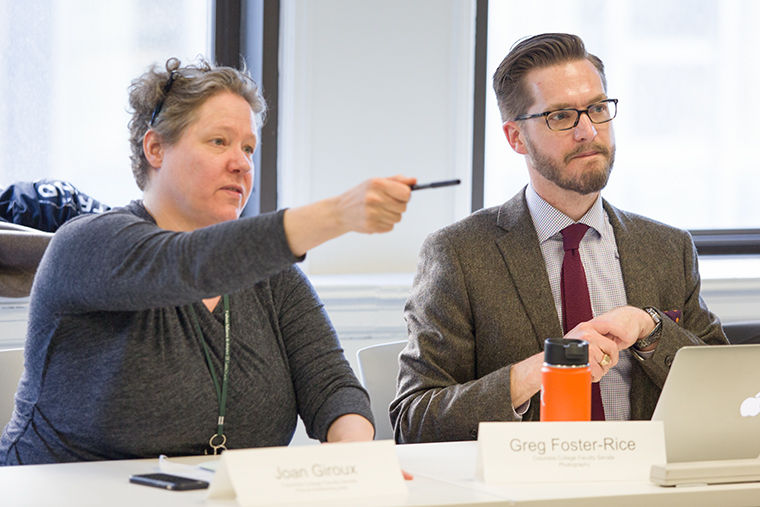Faculty senate votes to expand workload committee
Faculty Senate members addressed several motions about technology and faculty workload March 11 at the 600 S. Michigan Ave. Building.
March 14, 2016
In response to faculty concerns about uneven workloads, Columbia’s Faculty Senate approved a motion at a March 11 meeting to create a permanent committee to formulate policy on workload balance.
At the Senate meeting, Keith Kostecka, an associate professor in the Science &Mathematics Department, introduced a motion to approve the conversion of the Ad Hoc Faculty Workload Committee into a collegewide body including full-time faculty, staff, department chairs and deans.
“This is necessary because in hearing [past presentations], I could read how small the [ad hoc committee] happens to be and how not diverse [it is],” Kostecka said.
The Ad Hoc Faculty Workload Committee, which is chaired by Jim Van Manen, an associate professor of American Sign Language, was created in October 2015, to address inequities in faculty workloads and the lack of transparency in evaluating them, said committee member Hilary Sarat-St.Peter.
Immediately before the Senate meeting, the committee held a faculty discussion and presented a draft policy that would create numerical goals and assign points according to classes taught, service to the college, and research or creative projects.
These categories are identified by the college document on tenure as criteria for faculty evaluation.
“[The proposed system] just puts numbers associated with those [current] expectations instead of having them be unlimited,” Van Manen said. “Because we have no policy, there is no limit on any of these categories.”
Van Manen said the committee has researched more than 30 colleges’ and universities’ systems, including Emerson College, Pratt Institute and Chapman University, adding that the faculty and department chairs would determine point values in categories such as “research areas” that cannot be standardized.
Van Manen added that the committee’s next task is to focus on research, scholarships and creative work within the college’s many departments to understand their expectations and develop a fair system of evaluation.
“The benefit of a system like this is that it provides a great deal of flexibility to faculty. It puts a limit on the amount of expectation that the college can put on [faculty],” Van Manen said.
Several faculty members at the presentation, including Daniel Jordan, an associate professor in the Science & Mathematics Department, voiced concerns and made suggestions for the point system.
Jordan said while he currently feels included within the college community, the implementation of the proposed system would destroy that by interfering with academic freedom.
“It is a little bit insulting to be told that I need my workload clarified,” Jordan said. “That is what a tenure is; it is the understanding that faculty know what we are supposed to do and do it without a lot of oversight—without a lot of checking the boxes.”
Matt Doherty, a lecturer in the Design Department, said the
system was difficult to understand and posed questions regarding some obstacles he sees in the new proposed system.
“What would be an equitable point system?” Doherty said. “What is the common currency here?”
At the full Senate meeting later that day, the faculty passed another proposal to establish an Academic Technologies Governance committee.
The committee, according to Greg Foster-Rice, an associate professor in the Photography Department and Faculty Senate president, was proposed by Chief Information Officer Byron Nash and will include various faculty, staff, student and administrative representatives.
Diana Vallera, an adjunct professor in the Photography Department and president of P-Fac, the college’s part-time faculty union, and Louis Silverstein, an associate professor in the History, Humanities & Social Sciences Department, also visited the Senate meeting to announce the creation of a Columbia chapter of the American Association of University Professors, an organization that advocates for academic freedom and shared governance that several senators are already members of.
Silverstein highlighted the need for a chapter at the college as “dire” because of the current local and national climate of higher education.
“We are very artistic; we are very creative,” Silverstein said. “We also have to be very professional and join together with other faculty and other institutions to work for the common good.”








